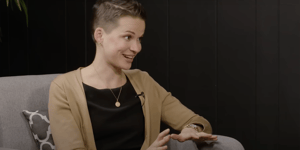In part one of a two-part interview, Dan and Catherine chat with Sofia Carozza, a neuroscientist conducting postdoctoral research at Harvard Medical School, on the complexities of the human brain. Sofia explains key aspects of brain development, neural plasticity, and the role of evolutionary biology in shaping the brain. Don't miss this insightful episode that highlights just how amazing and intricate the human brain is.
What is Neuroscience?
Neuroscience is one of the most rapidly developing scientific fields today. According to Dr. Carozza, it involves a dynamic combination of biochemistry, anatomy, psychology, and philosophy. In this way, it is an interdisciplinary field that aims to make sense of the biological functions of the brain in relation to human behavior.
While Dr. Carozza is currently a developmental neurologist, she additionally has a background in Philosophy and Theology, which aids in her ability to have an interdisciplinary understanding of the human person and the brain.
Biological Evolution and the Brain
As Dr. Carozza explains, nothing makes sense in neuroscience without the light of biological evolution illuminating how our origins lead to our cognitive abilities today. When observing the biological evolution of the brain, we can see that our brain is similar to other primates. Neuroscientists often compare human genes with the genes of apes to see how missing genes can potentially cause developmental issues.
However, while our brains are similar to other primates, we have a massively expanded neo-cortex responsible for our unique capacity for higher thinking, complex language, and symbolic thought. The parts of our brain responsible for these unique characteristics are extremely different from those of other animals.
How Neuroplasticity Makes the Brain Never Stop Evolving
As Dr. Carozza explains, the brain is in a constant dialogue with its environment. The brain always adapts to its environment, which helps us develop behaviors, form habits, and learn more complex ideas. This process is called neuroplasticity. Neuroplasticity happens dramatically in childhood but continues throughout our entire lives.
According to Dr. Carozza, one of the most fundamental aspects in forming our brain and its neuroplasticity is interpersonal relationships. Our relationships form our fundamental environment and how we interact with the world. Because of this relationship, Dr. Carozza advocates for loving relationships being a potential key to solving developmental problems in children and aiding the process of neuroplasticity.
Take a Listen
This episode of the Purposeful Lab Podcast demonstrates that the human brain is not only infinitely complex but also radically unique when compared to other animals. Our abilities to form complex social groups, participate in higher cognitive perceptions, and constantly adapt to our environments point to deeper philosophical and theological truths about the human person. Our brains are deeply purposeful and are much more than simply a product of biological evolution. As modern neuroscience continues to expand, the reality that the human person embodies a spiritual reality becomes more apparent.

